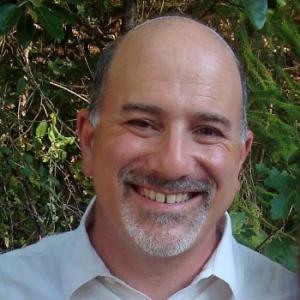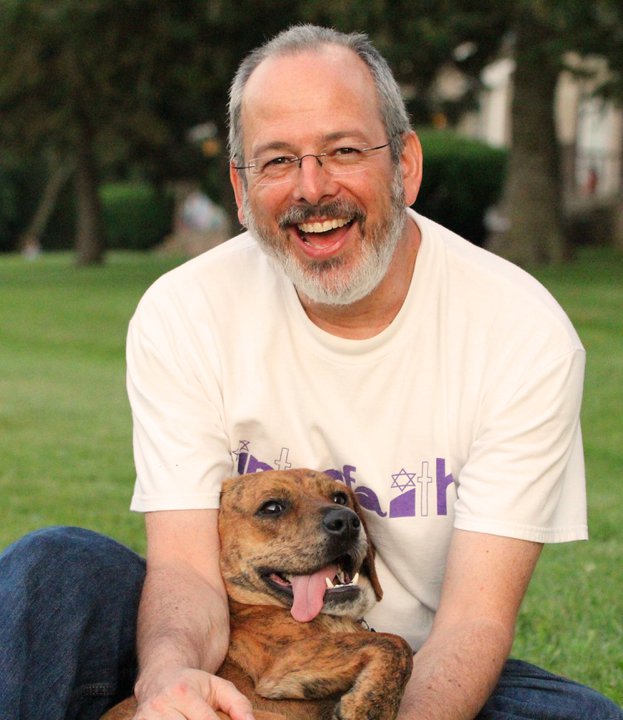 "B'reishit: A New Beginning," Spoken-Word Poetry
"B'reishit: A New Beginning," Spoken-Word Poetry
by Rabbi Paul Kipnes
At first,
Ein sof.
Nothingness without end.
It was God.
Only God.
All God.
And then;
from the most infinitesimal point
Of nowhere,
Came an explosion—
A big bold bang,
A fiery flash of blinding light—
And in what seemed like just a blink of an eye
To the Eternal,
(And magnificent millennia to we who came later),
The Multiverse burst into being.
Now there was God,
and not God—
as some saw God’s Creation—
An experiment in otherness,
With a possibility of partnership.
B'reishit. The next beginning.
[Now this might not have been the first beginning,
Oh no.
V’ha-aretz haytah tohu vavohu, we read (Gen. 1:2),
And Existence was all chaos, unformed—
Chaos that existed before the Six Days of Creation,
From worlds created and destroyed
Many times previously.
But those earth-creatures never left their Eden
And no partnership was formed.
So, foreshadowing the world-destroying flood in Noah’s time,
God started over
Once again.]
But this time
Near Eden’s rivers
God fashioned the female
And made the male too.
From what was at first an androgynous earth-creature (Gen 1:27-28),
God split the sides,
Like later God would split the Sea,
One became two (Gen. 22-23).
Hope reborn.
God Willed us into Existence,
Breathing into us
A nishmat chayim,
breath of life (Gen. 2:7),
Making us a little lower than angels
But still higher than hamsters.
We were
Pregnant with possibility,
The harvest of God’s hope.
God intentionally placed that tree in the Garden,
Right there in the center,
Right there in our way.
And pointing it out,
God made us promise
That we’d stay away (Gen. 2:16-17).
Still, God urged us on,
Slyly shaping that snake (Gen. 3:1),
To give our future
A fair shake.
So, like the children we were,
We succumbed to sweet promise,
And munched on that fruit,
As God watched from nearby,
A Most Pleased, Most High.
Then we two humans foreseeing (Gen. 3:22)—
Four eyes clearly seeing—
We rushed out of the Garden
For what lay beyond...
To live life,
In its fullness,
To face death,
So mysterious,
To live on nonetheless
In the face of it all.
To make babies
And mistakes,
Making up
And marking up
A world still becoming
As we are still becoming,
Searching out our divine purpose,
With each breath that we take.
Maybe there was no plan beyond that.
Just Divine Will,
And a Hope—
That this time would be different,
Because we would be different,
Transforming Existence,
And the One who is Existence,
Into what still might yet Exist —
If only we Will it.
Maybe we were never meant to languish in Eden;
We were to struggle and strive here on Earth (Gen. 3:16-19)
For a life not so easy,
For a purpose not so clear,
Creating justice and kindness if we dare,
For a future, not to fear.
Because when we do it right...
Vay’hi erev
Vay’hi voker
(And there was evening
And there was morning).
Hinei tov me-od
(And it [can be] very good) (Gen. 1:31).
B'reishit. We begin again.
How will you
Begin anew?
Thoughts on this Spoken-Word Poetry
(Author’s note: Try reading the spoken-word poetry aloud to better taste its rhythm and rhyme.)
And so we begin again, returning to B'reishit, exploring our foundational Jewish text through new eyes. Following Rabbinic Sage Ben Bag-Bag’s lead (“Turn it, and turn it, for everything is in it,” Pirkei Avot 5:22), we turn Torah over again, hoping that by viewing the same verses through a new prism, Torah might bedazzle us with its radiant chochma, “wisdom,” and luminescent k’dushah, “holiness.”
In Genesis 1:2 we read: “the earth was a chaos, unformed, and on the chaotic waters’ face, there was darkness.” These words suggest that even before God created anything, the earth and the chaotic waters existed in some form. What’s that all about?
The biblical commentator Nachmanides suggests that the world was created ex nihilo, “out of nothingness” (Ramban on Gen. 2:3). But Rashi and Ibn Ezra explore the possibility that something existed before this world. After all, we read: And there was evening (Gen. 1:5). To them, this suggests that evening was a reality prior to God creating anything else, which leads us to wonder: Was ours the first world God created?
A freewheeling Rabbinic discussion in Midrash B’reishit Rabbah 3:8 answers with an emphatic “No!” as it probes Torah’s hints that multiple worlds were created and destroyed before ours:
Rabbi Judah son of Rabbi Simon said: “Let there be evening” is not written here [in Torah], but “And there was evening” [was]; hence we know that a time-order existed before this [world’s creation]. Rabbi Abahu said: This proves that the Holy One, blessed be God, went on creating worlds and destroying them until God created this one, and declared, “This one pleases Me; those did not please Me.”
Rabbi Abahu suggests the chaotic, unformed earth and the chaotic waters described in Gen. 1:2 might have been the detritus of failed worlds, worlds that did not please God.
We wonder: Why wasn’t God pleased?
Perhaps in previous Creations, those versions of humanity might not have grasped hold of the fruit and eaten their way out into the world. Eternally children, they would not become equal partners with God in the struggle of Existence. As the Holy One thirsted for relationship and new insights, that humanity provided little possibility of growing in Divine wisdom. So God simply started over.
We wonder: What does this teach us about our purpose?
Ein Sof, the One who is Nothingness without End, seeks endless wisdom and understanding. God learns it with and through us. When we live life in its fullness, we transform ourselves, the Holy One, and all of Existence too. What’s our Divine purpose then? To live, love, and learn. To repair brokenness and grow in goodness. To continually redefine what it means to live b’tzelem Elohim, “in God’s image.”
 “What's our Divine purpose then? To live, love, and learn. To repair brokenness and grow in goodness. To continually redefine what it means to live b'tzelem Elohim, ‘in God's image.’”
“What's our Divine purpose then? To live, love, and learn. To repair brokenness and grow in goodness. To continually redefine what it means to live b'tzelem Elohim, ‘in God's image.’”
With these words, Rabbi Kipnes concludes his stirring, lyrical commentary on B’reishit, opening our eyes to the many avenues for interpreting and understanding our Torah’s story of Creation. Most importantly, he connects our own journeys—our own B’reishit moments—to the possibility of new beginnings.
Why do we care so much about the Creation story, anyway? Why is it important for us to know what happened “in the beginning”? Beyond our quest for empirical understanding of the universe’s origins, is there some other motivation for our curiosity? Perhaps we’re drawn to it because B’reishit only begins—it doesn’t end.
Not so with our own lives. We are so fragile. We bend, and sometimes we break. Creation happened so long ago that it can give us hope for our own lives—that we too can last. And lasting, we can sense that our lives mean something.
In the 1990s, while spending part of each summer on faculty at the URJ Kutz Camp, I would steal away with a few friends to a nearby video arcade where we played one specific game we all loved. Given enough quarters, we could sometimes finish that game. Along the way, there were many, many defeats. But as long as we had another quarter, there was hope of ultimate victory. As long as there was another quarter, “game over” never really meant the end.
Here are three examples where perceived defeat has led to new beginnings.
- In the wake of the global financial crisis (circa 2008), James Adams was fired from his lucrative Wall Street hedge fund job. To do some soul-searching, he applied for a job at McDonald’s. His application rejected (three times), Adams was hired by a local Waffle House willing to take a chance on a guy with an MBA but who couldn’t fry an egg. A year later, his life reset, Adams returned to the world of finance, this time to help and advise those who couldn’t afford financial consulting. (“I Went from Wall Street ... to Working at Waffle House,” Heather Long, CNN Money, March 17, 2016)
- In 1998, a friend of mine was diagnosed with breast cancer. Besides the needed medical work, she had to confront issues of fear, morale and mortality. With early detection, wonderful medical care, loving family and friends, and a good prognosis, she not only survived, but also saw her life settle into one of abiding gratitude and love.
- And then there’s Jonah, my son who died nine years ago. The journey that has unfolded since has had its ups and downs. There are still days when I’m overwhelmed by his absence, but that’s not where I live my life. Jonah was kind, loyal, funny, and, as happens with all parents, made me glad to be alive. With his death, for a while I felt like dying. But in time, I chose not to focus on how sad I am that he is gone, but on how wonderful it had been to have him around.
These are stories of deep loss and struggle that gave birth to something new. It took time and travail, but things got better.
Things get better. With another quarter, the game can resume.
Rabbi Kipnes’ poem concludes, “To live life in its fullness, to face death so mysterious, to live on nonetheless in the face of it all. [...] For a life not so easy, for a purpose not so clear. [...] Because when we do it right [...] hinei tov me-od (and it [can be] very good).”
In those darkest nights, may our sacred stories remind us that new days are always beginning.
B’reishit, Genesis 1:1−6:8
The Torah: A Modern Commentary, pp. 18–55; Revised Edition, pp. 17–50
The Torah: A Women’s Commentary, pp. 3–34
Haftarah, Isaiah 42:5–43:10 (11)
The Torah: A Modern Commentary, pp. 320−325; Revised Edition, pp. 51–55
Explore Jewish Life and Get Inspired
Subscribe for Emails


